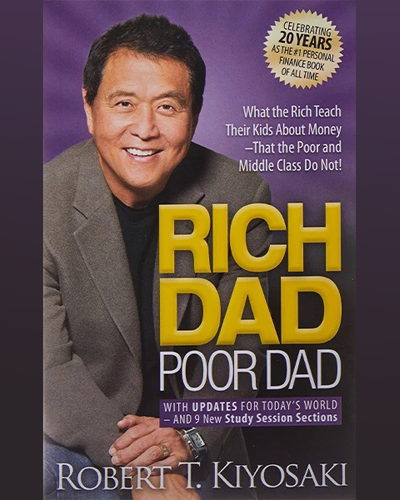Written through compelling parables that show the difference between a father with financial literacy and one without, Robert T. Kiyosaki gives us a self-help masterpiece with Rich Dad Poor Dad.
More than two decades after its initial release, the book is still a cultural touchstone. It’s earned many celebrity supporters and a cult following, and it has sold 32 million copies. But what does it say? And is it still relevant all these years later?

| Language | English |
| Release Date | April 11, 2017 |
| Genre | literature |
| Author | Robert T. Kiyosaki |
| File Size | 11656 KB |
| Rating | (4.85) |
Author Kiyosaki examines the two male role models he had growing up. The rich dad was his friend’s father. This man was able to amass wealth because of his view of money as a tool of investment. Meanwhile the poor dad was the author’s father, who spent his entire life struggling to make ends meet, even though he was a hard worker.
If you are wondering what Rich Dad Poor Dad says, it’s best to read the book. But in general, the lessons focus on knowing how to invest money and be proactive about finances, rather than relying on hard work alone to pay off.
The author says that the most important thing is learning the difference between an asset and a liability. Once you do, focus on buying assets and avoiding liabilities.
In short, in our world and our economy, you need to be smart about money. If you are, Kiyosaki claims, you don’t need a high income to end up rich.
While each lesson comes embedded in stories, they are broken up into six basic topics:
Among these six lessons, Kiyosaki emparts valuable financial wisdom. The fundamental idea is that rich people have their money work for them. Through investments and entrepreneurship, they create situations that make money in the long run.
By changing the way you look at money, and a little education in how assets work, you can liberate yourself from the grind of working for a paycheck. (Kiyosaki is particularly fond of real estate investment, which he dedicates large portions of the book to.)
And while people who work a day job think of it as a road to secure money, they can actually lose it at any time. Instead, building wealth that you own provides far more security.
If you want sound financial advice written in an approachable way, you should check out Rich Dad Poor Dad.
While nothing it says is particularly groundbreaking, the lessons are important to remember. In the many years since its publication, the book has inspired a lot of other guides — and some of these might serve your specific situation better.